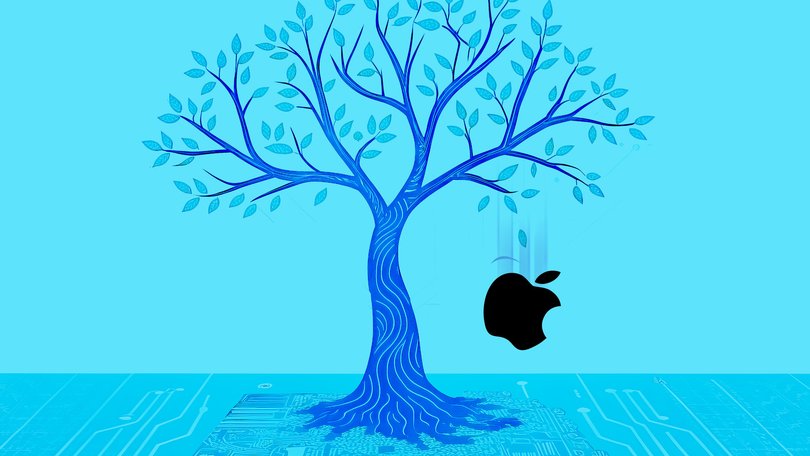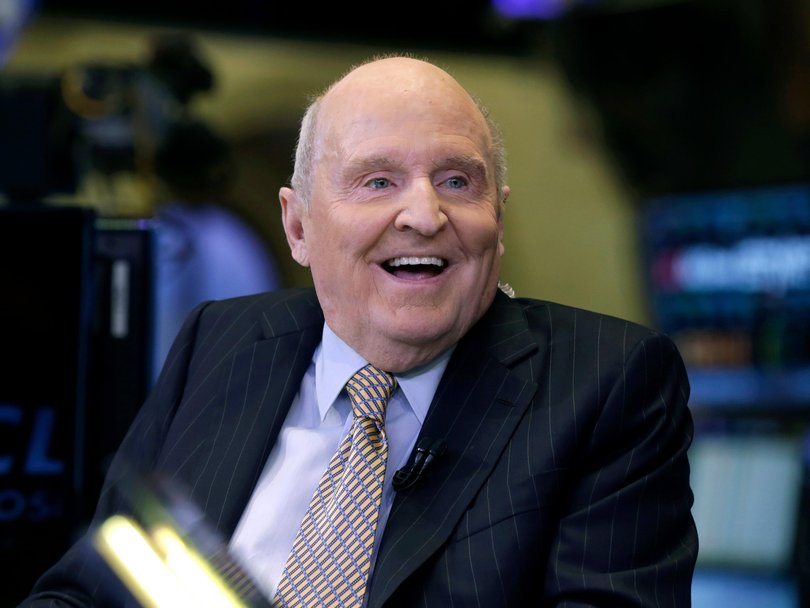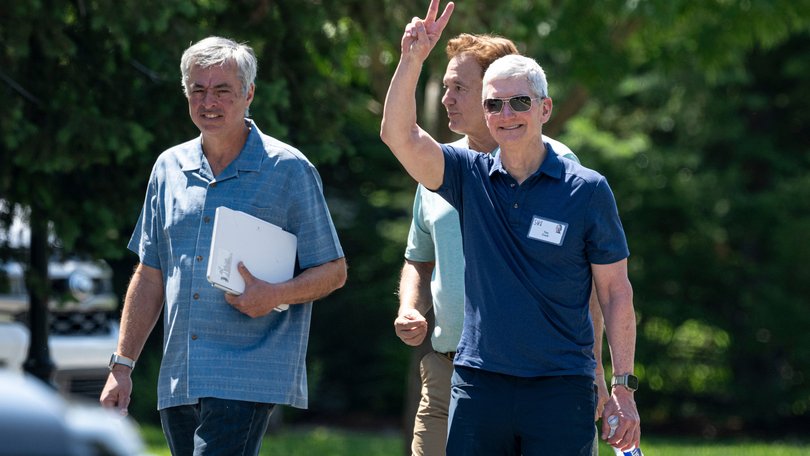THE ECONOMIST: Crunch time for Apple as as AI failure, trade wars and legal challenges bite at tech giant
THE ECONOMIST: AI failures, trade wars and regulatory challenges leave the company vulnerable

A year ago, when Apple used a jamboree at its home in Silicon Valley to unveil its artificial-intelligence (AI) strategy, grandly known as Apple Intelligence, it was a banner occasion.
The following day the firm’s value soared by more than $US200 billion ($307b) — one of the biggest single-day leaps of any company in American history.
The excitement was fuelled by hopes that generative AI would enable Apple to transform the iPhone into a digital assistant — in effect, Siri with a brain — helping to resuscitate flagging phone sales. Twelve months later, that excitement has turned into almost existential dread.
Sign up to The Nightly's newsletters.
Get the first look at the digital newspaper, curated daily stories and breaking headlines delivered to your inbox.
By continuing you agree to our Terms and Privacy Policy.It is not just that many of last year’s promises have turned out to be vapourware. Siri’s overhaul has been indefinitely postponed, and Apple Intelligence is no match for other voice-activated AI assistants, such as Google’s Gemini.
Meanwhile Apple’s vulnerabilities in China have been exposed by President Donald Trump’s trade war. Moreover, it faces new legal and regulatory challenges to the two biggest parts of its high-margin services business.
Its shares, down by almost a fifth this year, have lagged behind its big-tech peers, Alphabet, Amazon, Meta and Microsoft.
But those are not the most alarming comparisons. In a new book, Apple in China, Patrick McGee draws an ominous parallel between Tim Cook, Apple’s chief executive, and Jack Welch, boss of General Electric from 1981 to 2001.
Like Welch, Mr Cook has made a fortune for investors — when Apple’s market value first exceeded $US3 trillions, in 2022, it had risen by an average of more than $US700m per day since he took over from Steve Jobs in 2011.

But Mr McGee raises the possibility that, as at GE, Apple’s success may obscure serious vulnerabilities. If that is the case, what can Mr Cook do to avoid the sort of fate that befell GE and other once-great companies that suddenly lost their way, such as Nokia, a Finnish telecoms firm, disrupted by Apple in the early 2000s?
The answer did not emerge during the keynote address on June 9 at Apple’s annual Worldwide Developers Conference. Unlike last year Apple made few promises about AI, besides opening up the Apple Intelligence models on its devices to app developers. The biggest announcement was a new display that runs across its devices called Liquid Glass.
Many would prefer to see Mr Cook work on a new hardware strategy instead. Craig Moffett of MoffettNathanson, an equity-research firm, notes that the greatest moments in Apple’s history have come from the reinvention of what techies call “form factors”: the Mac reimagined desktop computing, the iPod transformed personal-music habits and the iPhone popularised touchscreen smartphones.
AI looks like it will be another such pivot point. (Eddy Cue, Apple’s head of services, recently admitted that AI could make the iPhone irrelevant in ten years.)
For now, Apple’s rivals have been faster to explore new opportunities. Meta and Google are pinning hopes on AI-infused smart glasses, as are Chinese tech firms such as Xiaomi and Baidu.
OpenAI, maker of ChatGPT, recently announced a $US6.4b deal to buy a firm created by Jony Ive, Apple’s former chief designer, to build an AI device. As yet there is only hype to go on, but it has put Apple’s lack of AI innovation in the spotlight.
Apple’s response may seem like dogged incrementalism. Next year it is expected to unveil a foldable phone, following a path blazed previously by the likes of Samsung and Motorola.
But Richard Windsor of Radio Free Mobile, a tech-research firm, thinks Apple may still have an ace up its sleeve. If smart glasses take off, its investment in the Vision Pro virtual-reality headset, though so far an expensive flop, may be an insurance policy.
It could provide Apple with enough expertise in headgear and eyewear to shift quickly to glasses. If so, the company will avoid “doing a Nokia”, he says.
Likewise, Apple might make use of this moment of soul-searching to rethink other shibboleths of Mr Cook’s tenure, such as the obsession with privacy and the high walls it puts around its family of products.
As Ben Thompson of Stratechery, a newsletter, points out, sanctifying the privacy of its users’ data has been an easy virtue for Apple to uphold because until recently it did not have much of an advertising business. Yet in the AI era, it has drawbacks.
First, Apple’s reluctance to scrape customers’ individual information makes it harder to train personalised AI models. Apple uses what it calls “differential privacy” based on aggregate insights, rather than the rich, granular data hoovered up by firms such as Google.
Second, privacy has encouraged it to prioritise AI that runs on its own devices, rather than investing in cloud infrastructure. Chatbots have advanced more rapidly in the cloud because the models can be bigger (awkwardly, this led Apple to offer some users of Apple Intelligence an opt-in to ChatGPT).
In order to overcome its AI deficiencies, it could splash out on buying a builder of cloud-based large language models (LLMs). But it has left it quite late. OpenAI’s deal with Mr Ive makes it less likely to ally with Apple.
Anthropic is close to Amazon, which has a big stake in the maker of the Claude family of LLMs. Other options are either Chinese or too small for a company of Apple’s heft.
Alternatively, it could relax its “walled garden” ethos of seamless integration, and partner with a variety of third-party LLMs, as Motorola, owned by the Chinese firm Lenovo, has done. Third-party voice-activated chatbots could quickly solve its Siri problem, giving renewed reason for people to upgrade their phones.

The likelihood is that Mr Cook will do nothing radical. As Mr Moffett puts it, his tenure has been marked by the steady ascendancy of “process over product”. Instead of flashy innovations, his hallmark has been metronomic reliability, especially with regards to financial performance. Nor has he any hope of swiftly extricating Apple from China.
As Mr McGee points out, even if Apple’s final assembly moves to India and elsewhere, the supply chain’s roots remain deeply embedded in the Middle Kingdom.
Yet this is no time for complacency. Whatever the ups and downs of AI — as Google has recently shown, yesterday’s losers can quickly become today’s winners — nothing turns investors off quicker than a profits shock. That is what makes the threats to Apple’s services business so serious.
The most striking risk is that the judge who declared Google a monopolist may order it to suspend payments to Apple that make Google’s search engine the default on the iPhone. The payments, which are partly for exclusivity and partly a revenue-sharing arrangement, generate about $US20b a year for Apple (last year its services revenue was $US96b).
David Vogt of UBS Investment Bank says that, if the judge imposes a ban on the exclusivity pafrt of the payments, it could cut Apple’s revenues by about $US10b.
“I’m getting calls every day of, ‘What will the market do to Apple stock if that happens?’” he says. Google has vowed to appeal.
Another looming threat is to app-store revenues, which are under scrutiny as a result of the EU’s Digital Markets Act, as well as from an antitrust lawsuit brought by Epic, a gaming firm, against Apple in America.
Bank of America estimates that app-store commissions generate $US31b a year of high-margin services revenue for Apple. If app developers steer customers away from Apple’s app store as a result of the rulings, it could clobber the lucrative cash cow.
Services have been the brightest spot of Mr Cook’s tenure in recent years, helping to mitigate stagnation in iPhone sales. It will certainly be a blow if the line of business suffers.
But if it prompts Mr Cook to tear up his own rule book on AI and everything else, it may be worth it in the end.
Originally published as Can Tim Cook stop Apple going the same way as Nokia?
